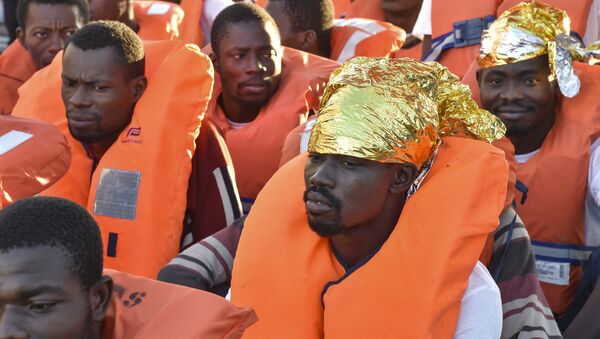Sputnik: What do you think is the primary reason behind the decline in the number of migrants to Italy has been?
Paolo Salom: The main reason is the way that the government of Italy reached an agreement with the governments of a few countries just opposite ours in the Mediterranean, so the main countries that I'm speaking of is Libya of course. The problem is that within Libya, the government of Tripoli does not control the whole country, so we had to arrange a sort of double agreement between the two main forces that operate in Libya, the Tripoli government and the Tobruk government, so this way, aided by the Italians, they stop migrants before they can go to sea to reach Italy.
Sputnik: Overall there has been a lowering of the number of migrants that have been coming to Europe; is that due to similar reasons, or would you say that the decrease in numbers of migrants attempting to come to Europe by sea is not for the same reason that Italy has been successful reducing the number of migrants?
Paolo Salom: First of all, I must say that the crisis is being controlled, but it’s not over. Anytime in the future we could see something of the same situation as before, but you have to consider that Europe has struck a deal with another country which has a huge number of potential migrants, which is Turkey, and Europe promised to give a lot of money to the Turkish government to keep these refugees inside their borders instead of letting them board ships to the European continent. You have to consider that with this kind of movements of people, you always have to strike deals with countries where they’re coming from; it’s compulsory you cannot just rely on your ability to govern or to master these huge problems.
Sputnik: Why wasn’t the this approach taken before?
Paolo Salom: the amount of people we had to save probably was smaller in numbers, but actually we had crises like these in the past, for instance from Albania, in the last decade of last century, we had a crisis like that; and we had to strike a deal with the government in Albania to be able to repatriate the most part of the people that came across the Adriatic Sea in huge numbers. As you can imagine, these crises happen every several years for different reasons. After a while, you start to gain experience and you know what to do.
Sputnik: It’s also interesting to note that in 2017, Italy spent €180 million on stimulating growth in Africa. Was that successful; do you think that perhaps this is a good response to an influx of migration by, perhaps, targeting some of the reasons why people leave?
Paolo Salom: Probably, I think that the potential countries where people come from and the poor people decide to take this perilous journey to find a better life in Europe, you cannot even think of solving the problems just by giving money to these countries. Yes, it’s something that can help, at least if you decide to send money and people to the places where these migrants more easily go through, it’s not the best thing you can do. The best way you can reach your effort is by striking deals with countries which are the last part of the journey before crossing the Mediterranean.
Sputnik: Perhaps maybe like a complex of different measures are needed. In any case, the number of arrivals in from Libya has dropped significantly, but now you have Eritrea and Tunisia topping the list as far as the number of illegal migrants from those two countries coming to Italy. Do you foresee that the Italian government will be able to have some kind of cooperation between themselves and Eritrea or Tunisia?
Paolo Salom: You always think that the right way to deal with this kind of problem is to talk to your counterpart, but it’s not always possible. As with Tunisia, it’s maybe a little easier because we have a history of good relations with this country. Eritrea, that’s a different situation, because you don’t have a reliable government there in the sense that it’s leadership is a very hard country; the hardship that people face there, they really struggle, so I think our government should consider all these differences between the two countries before deciding what to do.
The views expressed in this article are solely those of the speaker and do not necessarily reflect the official position of Sputnik.

